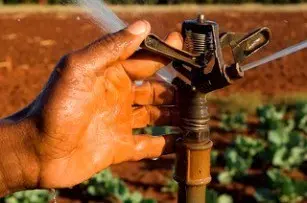The key to unlocking the agricultural potential and improving food security in sub-Saharan Africa lies in the development of water irrigation schemes, according to the claims of a survey by the International Water Management Institute (IWMI)
The CGIAR-supported research centre, has released a report claiming that yield increases of up to 300 per cent could be achieved through the provision of smallholder water management facilities.
The report argues that despite water resources being plenty available, the main problem for African farmers is the lack of means to access the water. This in turn leaves crops heavily reliant upon the seasons, limiting the yield potential.
Meredith Giordano, coordinator of the IWMI initiative, explained "Cheap pumps and new ways of powering them are transforming farming and boosting incomes all over Africa and Asia. Simple tools for drilling wells and capturing rainwater have enabled many farmers to produce more crops in the dry season, hugely boosting their incomes."
IWMI director general Dr Colin Chartres said, “Farmers across the developing world are increasingly relying on and benefiting from small-scale, locally-relevant water solutions."
According to the report, sub-Saharan farming has already benefitted significantly from water irrigation facilities. IWMI has claimed that US$22bn in annual additional household net revenue has been generated as a result of supplying 185mn individuals with motor pumps, and likewise, net revenue of US$9bn has been produced through 147mn farmers being provided with rainwater harvesting tools.
Chartres concluded, "There are huge investment opportunities for unlocking the potential of this farmer-led approach.
"AgWater Solutions has identified where investments can be targeted for maximum impact at the country, state and local level. We now know which 'levers' need to be pulled to capitalise on the up-swell of farmer-led innovations."





